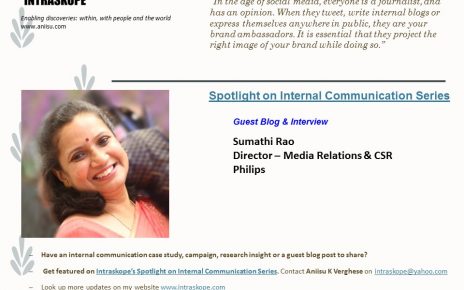In an earlier post I shared Benjamin’s case, an employee who felt that doing just that much as the role expects is enough at the workplace. What differentiates a dormant employee from an engaged one is the discretionary effort the individual makes. Sometimes referred to as citizenship behaviors it is also about the contextual performance that gets exhibited at the workplace.
Often measured in engagement surveys discretionary effort is about doing things that are beyond the regular job description and add value to the organization in a positive way. Even when there are no guarantees of rewards and recognition. In organizations, those who go the extra mile are often referred to as ‘high potential’ employees. An article in HBR goes on to state:
“High potentials consistently and significantly outperform their peer groups in a variety of settings and circumstances. While achieving these superior levels of performance, they exhibit behaviors that reflect their companies’ culture and values in an exemplary manner. Moreover, they show a strong capacity to grow and succeed throughout their careers within an organization—more quickly and effectively than their peer groups do.”
What matters is that it can be effort towards personal development, helping other employees succeed or interventions that prevents any harm that happens to the firm or improves how the organization functions.
Take for example, when an employee notices that the values are not being followed and takes an active interest to report the issues, correct the situation or prevent it from taking place again. That behavior is called whistleblowing in some situations. All this means the employee steps beyond the expectations of the job but looks at the organization from the context of a social entity whose culture is threatened.
Or, when an employee has an idea to improve a process or create a system that will generate positive outcomes for the organization – he or she will enlist the support of others to make it happen.
How do you spot when someone is taking discretionary effort? Differentiating what is an ‘expectation’ from the role and what is ‘discretionary’ effort is based on how well the manager understands the job the employee is expected to perform towards and the context within the organization. You can figure out those who go over and above by observing how they engage and what actions they take when ‘no one is watching’.
Going the extra mile doesn’t mean staying late hours. It doesn’t mean whining about the workload. It doesn’t mean being competitive about the work you do. It doesn’t even mean trying to project an image of working ‘hard’.
There will always be work to get done and time and other resources will continue to be a constraint. Your ability to stay calm, focus on the work at hand, resolve conflicts in your mind and among leaders, peers, and subordinates will take you further.
There are employees who can also ‘game’ the system by acting what seems like ‘discretionary behavior’ to please and ‘impress’ influencers within the organization. Such employees can be a bane because they aren’t doing their ‘extra’ role with true intent. It will only last as long as someone is watching and it can demotivate others around who notice this ‘game’ and when it goes unpunished. Then, they feel that they should either play around or exit the organization.
Going the extra mile is also about looking back and revisiting and acknowledging learning, making a commitment to improve and staying positive in thoughts and deeds. That maturity in thinking and humility to appreciate that we can continually get better at what we do is what differentiates the best from the rest.
In an increasingly competitive world where market conditions evolve rapidly organizations continue to be dependent on the support, positive attitude and actions of employees to go above and beyond their work to accomplish performance and achieve success. Communication, willingness to cooperate and purpose are three essentials for organizations to exist and survive. Organizations strive to increase performance through their employees. Understanding relationships that influence discretionary effort can direct personnel interventions.
It will help for organizations to ask pointed questions while interviewing candidates to gauge if the prospective hire is willing to go the extra-mile before signing them on. There are enough signs that will tell you – from their choice of words, the selection of examples and their actions over the years. Getting someone with the positive intent to move the organization with extra-role behavior is more beneficial that someone who is just ticking the box.
What are your thoughts?



